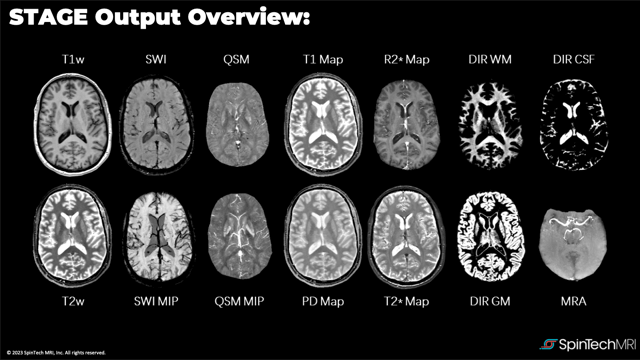
Health system priorities for AI and two important questions for radiology leaders
By: Karen Holzberger, President & CEO of SpinTech MRI
A new report from UPMC’s Center for Connected Medicine and KLAS Research about the AI use cases that health systems are prioritizing over the next few years includes findings about plans for radiology AI that raise two important questions for neuroradiologists and healthcare leaders:
- Are today’s radiology AI models solving the right problems?
- Are other solutions available that can improve operational optimization now and support the continued development of AI for brain MRI?
Based on a survey of 58 executives and senior managers at provider and payer organizations, the report examined AI for “Optimizing Clinical Trials at Health Systems.” It also asked them to rank the AI use case categories they’re investing in today and over the next two years. While radiology currently ranks third, it drops to 7th after planned investments for operational optimization, health/disease management and prediction, population health management, value-based care, patient engagement and clinical research. As the report states, many health systems are focused on AI’s potential “to improve operational efficiency amid financial pressures, staffing challenges, and other concerns.”
The answer to the first question may be “It’s complicated.” Numerous studies have demonstrated the potential benefits of AI models for augmented interpretation and workflow automation. However clinical adoption is slowed by clinical, practical and data science concerns, especially the availability of robust training data needed to develop models that can generate reliably accurate outputs at scale.
STAGE optimizes MRI utilization…
The answer to the second question is a straightforward “Yes.” Instead of using AI-based image reconstruction with subsampled data from abbreviated exams, our FDA-cleared STAGE (STrategically Acquired Gradient Echo) software platform uses advanced MRI physics to acquire fully sampled data and reduce brain scan times by 30% on most 1.5T and 3T machines. It has been proven in years of use in by neuroradiology and neurology researchers worldwide. Last year we adapted and enhanced STAGE for everyday clinical use.
STAGE uses advanced post-processing techniques to generate images with greater clarity and contrast and reduced noise for up to 14 different image types. That improves radiologists’ diagnostic confidence for more efficient reading and reporting. STAGE also generates susceptibility-weighted image (SWI) maps for better detection of disease biomarkers and lets radiologists view additional outputs as needed, often without the need for a rescan. The resulting improvements in MRI efficiency can help reduce imaging backlogs and optimize radiology operations overall.
…and supports the development of robust training data
Rather than competing with AI, STAGE can contribute to model development for MRI. STAGE produces standardized cross-platform data to support the clinical use of quantitative MRI techniques and to simplify longitudinal monitoring of neurological disease progression and treatment efficacy. That’s becoming increasingly important for addressing an expected increase in MRI exams required for new Alzheimer’s drug therapies. Standardized STAGE data also can be aggregated into robust training datasets for AI model creation, enhancement and surveillance.
Operational – and revenue – optimization
In addition to its clinical and operational advantages, STAGE offers a truly compelling business case. Testing on six different scanners at a busy U.S. health system with large neuroradiology volumes showed that shorter scan times with STAGE effectively opened 3 to 4 more scanning slots per scanner per day. Projected annual revenue increases were $240,000 for each 1.5T system and $320,000 for each 3T system.
Visit our website to learn the details of the results of STAGE testing. You can also view a recent Imaging Wire interview with SpinTech MRI CEO Karen Holzberger and neuroradiologist Dr. James Backstrom, MD, who describes how STAGE is helping a community hospital consolidate operations from two scanners to one.

